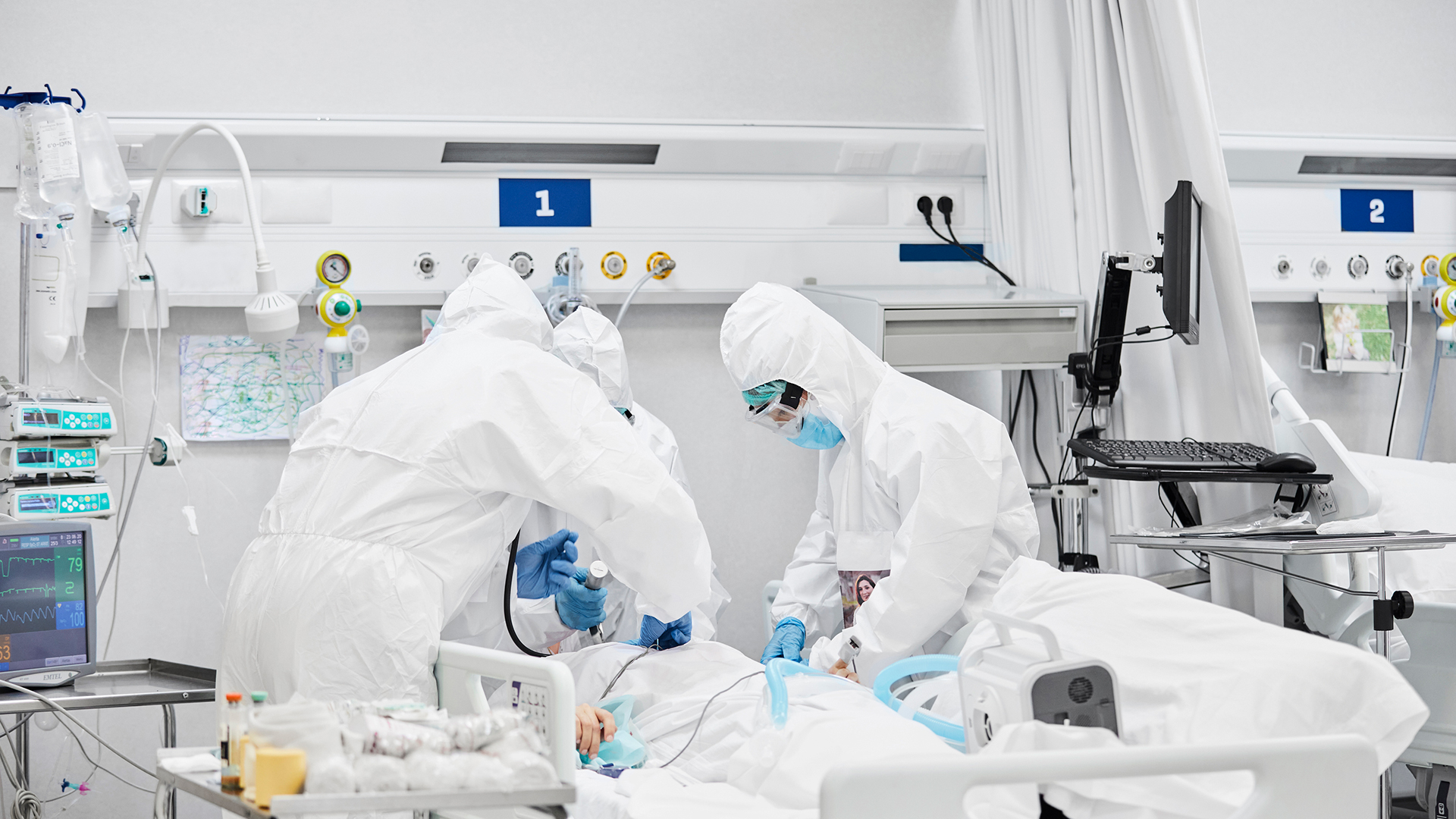
Drs Natalie Ashburner and Richard Gilpin of the Doctors’ Association UK discuss the impact of the COVID-19 pandemic on the welfare of healthcare staff.
Mental ill health is the largest cause of disability in the UK and costs £105.2bn each year. It has been widely recognised for years that there are high rates of mental illness, including anxiety, depression, substance use and burnout, among healthcare workers. A systematic review in 2018 found that the prevalence of psychiatric conditions among UK doctors is 17-52%; the same study also estimated that between a third and half of all doctors were experiencing burnout.
In April 2020, the Doctors’ Association UK (DAUK) conducted a survey of 350 healthcare workers which found that 57% of respondents have felt so stressed that they have been overwhelmed or unable to cope because of pressure at work during the last month. The anonymous survey also found that 11% of responders had felt suicidal and 3% had self-harmed in the past month because of stress from increased pressure at work.
Stress and distress during epidemics
The high rate of mental illness in healthcare workers and the significant psychological impact of previous epidemics on healthcare staff was widely recognised prior to the COVID-19 pandemic. Studies on the psychological impact of the 2003 SARS epidemic in China showed that 10% of hospital staff had symptoms of post-traumatic stress disorder (PTSD) during the epidemic and almost half of nursing staff showed probable emotional distress.
The Institute for Public Policy Research surveyed 996 health and social care staff and found that 50% of staff felt that their mental health had declined in the first two months of the pandemic. The Royal College of Nursing surveyed 42,000 nurses and found that 76% felt that their stress levels had increased and 52% worried for their mental health. A Medscape study of over 1,000 doctors also had results consistent with these, with findings indicating that of those doctors reporting burnout, 68% felt that working during the pandemic had worsened this. It also found that female doctors were a third more likely to be burnt out than male doctors. Reducing patient caseloads was the intervention that doctors most stated would improve their mental health.
More recently, in October, the Doctors’ Association UK surveyed over 800 GPs and 78% reported that working during the COVID-19 pandemic had impacted negatively on their mental health. One respondent commented: “My mental health has reached the stage where I have even thought about crashing my car on the way to work.”
Alleviating pressure and improving welfare
Even when we are no longer in the peak of the pandemic, as we begin to tackle the backlog of demand for services put on hold, we must remember that we cannot spread services too thinly. The same staff who worked on the frontlines during the pandemic are the same staff manning the routine services. We cannot place insurmountable pressure on staff who are suffering from psychological distress, at high risk of mental illness and expect them to cope. Adequate resourcing and funding must be provided, and the wellbeing of staff must be a priority. Prolonged breaks from working, adequate rest on shift and appropriate remuneration for their work are essential.
In addition to this, we must remember that mental health services are also under-resourced and extremely stretched. These services will not be able to cope unless we adequately fund and resource them and, more specifically, develop more services that specialise in the treatment of healthcare workers such as the Practitioner Health Programme.
Despite all the evidence of the mental health impact of COVID-19 on health and social care workers, little will change while the same mismanagement, slowness to react and lack of communication continues to dominate the decisions taken by those in charge. Whilst we continue to fail to contain this virus, we will continue to see rising rates of sickness in the NHS due to mental illness and burnout. In addition to this, many mental illnesses have a slow and insidious onset. We will continue to see the effect of this pandemic on the mental health of NHS workers for the next two to three years. Without the above, and without also achieving parity of esteem for mental health services, we risk the loss of a workforce that is already severely depleted.
Access to support
There is plenty that can be done to shore up support for the welfare of clinical and hospital staff. There were some heart-warming examples of hospitals prioritising the wellbeing of staff at the start of the pandemic, from free parking and warm meals for staff to yoga and meditation. Beneficiaries have noted that when hospitals listen to what can be done to help with the wellbeing of doctors, what is suggested is often simple and actionable. It is not unreasonable to expect this to continue. Quality criteria exist for junior doctors and mostly reflect this; in 2018 the Joint Royal Colleges of Physicians Training Board issued quality criteria which recommended ‘adequate facilities to support basic needs such as parking…rest areas, kitchen facilities and access to both hot and cold food’.
Ensuring that these basic needs are met can only positively affect patient care – as a patient, of course you would want your surgeon to be well at work, with somewhere to park so they can arrive on time, a nutritious meal to support them through the shift, and an appropriate space for them to work from. However, there is a feeling among some doctors that some of this has been tokenistic. Our survey in April asked whether doctors felt that they had been offered adequate support from their employer for their mental wellbeing. Almost 48% of the 350 staff said that they did not feel that the support had been adequate.

Learn not Blame
Doctors should also feel supported by their organisation, so that when things go wrong, systemic failings are addressed, and lessons are learned. This is central to DAUK’s Learn not Blame campaign, which promotes learning from adverse events and prioritises fairness, openness and the wellbeing of both patients and health care professionals. Adopting this approach not only supports clinical staff but will improve patient care by learning from errors and working to prevent them in the future.
The public may not be aware that alongside delivering healthcare, the NHS is one of the largest training organisations in the world. It is responsible for developing the clinical skills of most doctors, nurses, and allied health professionals in the UK. We train nearly 9,000 new doctors per year in the UK, and it takes at least 10 years to become a GP and 16 years to become a consultant. COVID-19 has meant that doctors wishing to develop their knowledge and experience have been set back. For example, a trainee surgeon may be expected to have performed surgery to replace a knee joint a certain number of times prior to becoming a consultant; this is deemed adequate experience to be able to work independently. With redeployment and loss of routine work, many trainees are not learning the skills they need to progress, and this may mean a shortage of specialist doctors in the future. We need medical students to train to become junior doctors and in turn, we need junior doctors to train to become GPs and consultants.
In addition to this, post-graduate examinations have been delayed or cancelled. Hospital physicians must complete at least four post-graduate examinations at a cost of over £2,000. Clinical examinations that require face-to-face interactions with patients have – understandably – been cancelled, and all written examinations were initially cancelled. Many of those that have since been moved online have been plagued with technical issues.
It is unthinkable that training organisations would consider progressing doctors who have not obtained all the appropriate training, so there are fears that this will result in a concerning loss of specialist workforce. There is hope that in the aftermath of this pandemic, the system will support doctors as much as possible, but with staffing shortages and an NHS recovering from a massive backlog of work, it will not be an easy task and we fear that the training and career progression of junior doctors will suffer, thus impacting patient care through shortage of expertise for years to come.
Policy and messaging
Throughout the pandemic, the UK government has adopted a command-and-control approach to managing the crisis. This meant that despite NHS staff sending a consistent message to the government and policy makers, they have not felt listened to, consulted, or supported during this pandemic. As doctors, we have a duty to ensure the public is informed about conditions on the frontline and during a pandemic it is more important than ever that NHS staff feel able to raise concerns.
DAUK has reported numerous cases where healthcare staff have been prevented from speaking openly about issues within the NHS such as frontline conditions, PPE shortages and inequitable vaccine distribution. Staff who have spoken out have been sent intimidating emails, have been threatened with disciplinary action, or told that their careers will be impacted.
Subtle attempts at coercion have been common. Trusts often cite the principles of the General Medical Council’s Good Medical Practice in their emails. A referral to the General Medical Council is a process that most doctors fear, and with good reason; it is often a traumatic process and there is an incredibly high rate of suicide for those under investigation by the GMC.
This subtle mention in an email about doctors who raise concerns or speak out when they see issues, is enough to scare many into submission. An email sent from a postgraduate dean to doctors read: ‘We are receiving reports that some [doctors] are questioning local decisions that have been made to redeploy [doctors]… it is really important that we remain professional and continue to respect and enact the principles set out in [the General Medical Council] Good Medical Practice’. This would be read by many doctors as ‘do what we say, don’t question it, or we will report you to the General Medical Council’.
Healthcare workers need to feel able to speak up when they have concerns about patient safety. Working conditions have been exceptionally tough. It is not unreasonable, one year into the pandemic, to expect that the staff who are treating this virus every day, are experienced enough to understand how it should be managed. Organisations should be open to feedback and there should be receptive and transparent processes to ensure that the feedback is listened to and subsequently acted upon.

About DAUK
The Doctors’ Association UK is a non-profit campaigning and lobbying organisation, comprised of volunteer UK doctors and medical students, advocating for both the medical profession and patients. It was founded because frontline doctors should be instrumental in shaping UK healthcare policy, yet they often tell us that they feel unheard, powerless and disenfranchised. Our goal is for our collective voice to speak to the government when it is developing policy and to be engaged with media outlets whose opinions inform the public about the state of the NHS.
Dr Natalie Ashburner
Vice Chair
Dr Richard Gilpin
Editorial
Doctors’ Association UK
www.dauk.org
This article is from issue 16 of Health Europa. Click here to get your free subscription today.








